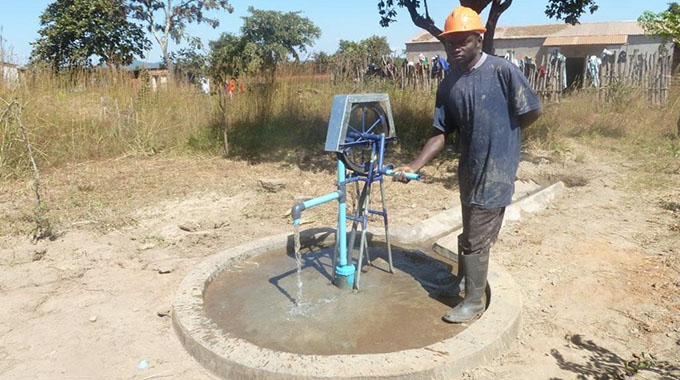
Cletus Mushanawani
Simple technological innovations like the rope and washer pump system can be made using locally available waste material to help irrigate crops and enhance the country’s food security position.
The rope and washer pump system can be made using worn-out tyres, ropes, washers and pipes. It is a human powered hand operated pump that can be used to lift water from open water source with applied human power.
The unique characteristic of rope pump is that rope together with the pistons function as an endless band to transport water.
This system can be applied to access water for both irrigation and drinking purposes.
It can increase the efficiency of water used in irrigation; something that can provide appropriate technology for smallholder farmers in bringing water to the desired place in the field from water sources like wells, rivers and other open sources.
Development Aid from People to People Frontline Institute (DAPP) in Bindura South is training students to utilise waste materials to make rope and washer pumps to boost smallholder agricultural productivity.
The institute, which attracts students from as far afield as Asia, South America and other parts of Southern Africa, is now a centre of excellence for low-cost water technologies that can be used to transform the livelihoods of smallholder farmers.
“We are training our students to shift from reliance on outside solutions to utilising locally available resources for the benefit of local communities,” said DAPP Frontline Institute’s principal Doubt Musiwa.
“We are promoting this simple innovation to help cut costs for smallholder farmers. The rope and washer pump system has a capacity to irrigate half a hectare of land depending on the availability of water.
“It is not only cost effective, but user friendly as a single person can use it to irrigate the crops.”
Musiwa said the rope and washer pump system cost about ZWL$100 to set-up, which makes it affordable to most local farmers.
The rope and washer pump systems that were being made at the institute were now being taken up by most farmers in Bindura South.
“Many people are now placing orders for the pumps,” said Musiwa.
“Many customers are coming here to make enquiries. Some have adopted it for their horticulture farming projects.”
Besides the rope and washer pump system, the institute also promotes conservation agriculture practices.
A rope and washer pump system has a wheel that must be turned by someone to send the rope and washers down the well shaft and through the riser to the discharge point, forcing water out through the pipe.
Rope and washer pumps are one possible solution for getting water efficiently from wells in rural communities. They are a great alternative to more expensive and complicated factory-produced pumps that can be difficult to maintain or use diesel or petrol.
These simple machines can pump water from up to 25 metres underground.
“We are proud to say, we support education, self – reliance and in addition enhance people’s access to water,” said Musiwa.
“These are simple technologies that we should promote to help increase both household and national food security in the country.
“We have a lot of waste at our disposal, which we can convert into life-changing technologies. Gone are the days of looking to developed countries for innovations to help local communities.
“We should wake up from our slumber and come up with our own home grown solutions to the challenges we face on a daily basis.”
Musiwa pointed out that it was important to equip students with life skills.
“They come to get the knowledge, understand what they are learning and we challenge them to understand that education alone can only become vital when it is translated into practice.”
Smallholder farmers play a critical role in the country’s food and nutrition security, accounting for the bulk of the country’s food output. However, they often lack appropriate technologies to harness water to increase their agricultural production.
This has often led them to grapple with poverty and food insecurity. Lack of water and appropriate labour saving technology to utilise it, have hampered their capacity to increase their productivity.
Worldwide, the poorest have the least access to land and water, according to the Food and Agriculture Organisation (FAO).
FAO experts say it is important for policymakers to focus on efforts that increase the overall efficiency of water use by the agricultural sector to improve food security and tackle hunger.
Promoting the use of simple labour saving technologies could be an answer to problems facing smallholder farmers in Zimbabwe and across many African countries.
